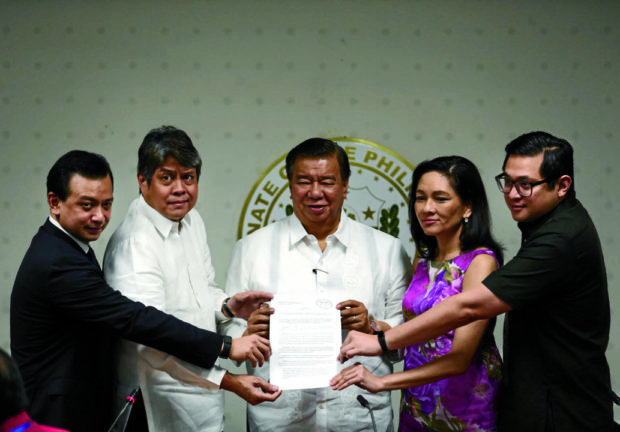Trillanes: Lawmakers who refuse to tackle martial law in session could be held liable

Copy of resolution to convene Congress in Joint Session and deliberate Proclamation no. 216 (declaring a state of Martial Law and suspending the writ of habeas corpus in the whole of Mindanao) filed by Senate Minority bloc members.
INQUIRER PHOTO/LYN RILLON
Members of the Senate and the House who would refuse to deliberate in a joint session of Congress the martial law declaration in Mindanao could be held liable if a complaint should be filed at the Office of the Ombudsman, Sen. Antonio Trillanes IV warned on Tuesday.
Trillanes is part of the six-man minority bloc in the Senate that filed a resolution calling for a joint session of Congress to deliberate on President Rodrigo Duterte’s declaration of martial law and the suspension of the privilege of the writ of habeas corpus in the whole of Mindanao.
“Palagay ko pag hindi talaga natuloy itong joint session, kung merong magpa-file sa Ombudsman ng dereliction of duty, ang mga mananagot dito would be the Speaker of the House, yung Senate President at those who openly expressed their opinion na hindi kailangan,” he said at a joint press conference with fellow opposition senators.
If Congress would not convene a joint session, Sen. Franklin Drilon, the minority leader, said a petition could also be filed at the Supreme Court to question the factual basis of the martial law declaration.
“And the SC must decide on that within 30 days from the filing of the petition,” Drilon said. “This constitutional provision is a result of a situation in the 1972 martial law when the court refused to review the factual basis of the martial law declaration because it was a political question.”
Article continues after this advertisement“The Constitution specifically mandates the Supreme Court to rule on the factual basis of the declaration within 30 days from the time the petition is filed,” he stressed.
Article continues after this advertisementAsked if the minority group would initiate the filing at the SC, Sen. Francis Pangilinan said they had initial talks on that but they they had not come up with a final decision.
“Bukas kami. Pero tingnan natin kung ano ang magiging resulta nitong debate,” Pangilinan, president of Liberal Party, said.
He cited, however, three bases why Congress would have to convene in a joint session: It’s mandated in the Constitution, there’s a legislative precedent, and the Supreme Court has ruled that a joint session of Congress to deliberate on a martial law declaration should be “automatic.”
Pangilinan dismissed some of his colleagues’ argument that a joint session may only be called to revoke a martial law declaration.
“What if somebody wants to revoke in a joint session?” he said. “How will she or he make the vote known or make the intentions known if you don’t convene? Ibig sabihin wala ng boses ang minority? This is anti democratic for an institution like Congress not to convene the joint session to deliberate precisely what is a very serious extraordinary power of the executive department.”
“We have to convene even if it’s ministerial,” he added. “Assuming, for the sake of argument, talagang 100 percent bobotong pabor, we still have to convene. There’s still has to be a public proceeding. There’s still has to be a record of the proceeding because we’re doing official acts and this is mandated by the Constitution.”
Sen. Bam Aquino said Congress could not make a shortcut in the process.
“Yung mga shortcut sa bansa natin yun ang nagdudulot ng masasamang bagay,” he said. “Ayaw nating mag-shortcut ang AFP (Armed Forces of the Philippines). Ayaw nating mag shortcut yung PNP (Philippine National Police). Bakit tayo magsho-shortcut?”
“And our position is that this is part of our constitutional mandate, gawin natin,” he added.
Sen. Risa Hontiveros, meanwhile, said it was a shame that the minority bloc had to file a resolution to call for a joint session of Congress. /atm/rga